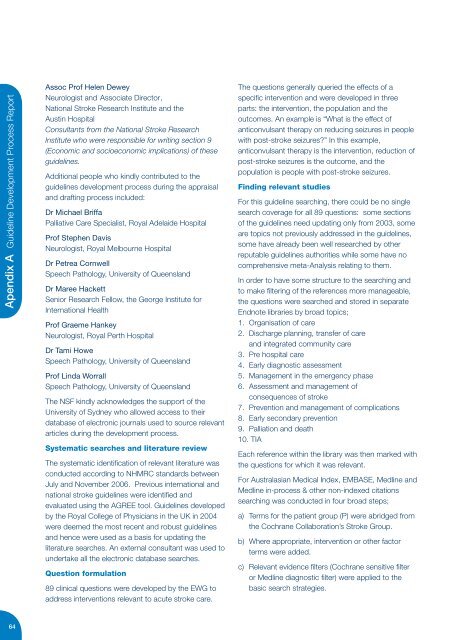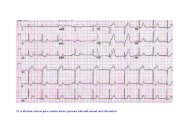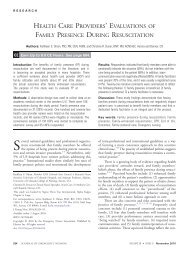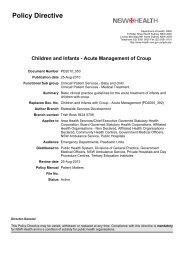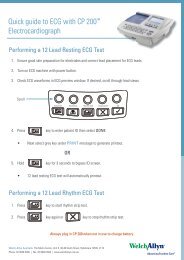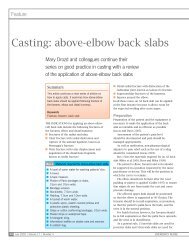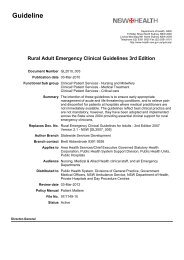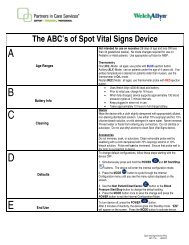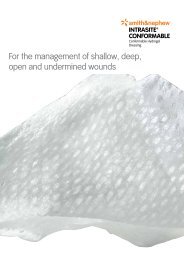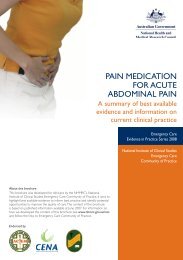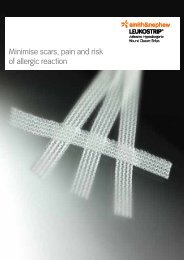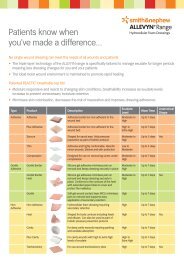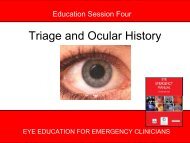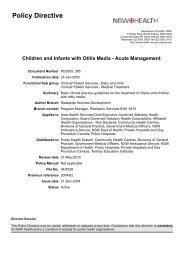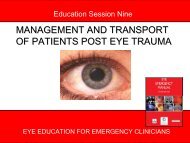Clinical Guidelines for Acute Stroke Management - Living on the EDge
Clinical Guidelines for Acute Stroke Management - Living on the EDge
Clinical Guidelines for Acute Stroke Management - Living on the EDge
You also want an ePaper? Increase the reach of your titles
YUMPU automatically turns print PDFs into web optimized ePapers that Google loves.
A Guideline Development Process Repor t<br />
A<br />
pendix<br />
Assoc Prof Helen Dewey<br />
Neurologist and Associate Director,<br />
Nati<strong>on</strong>al <str<strong>on</strong>g>Stroke</str<strong>on</strong>g> Research Institute and <strong>the</strong><br />
Austin Hospital<br />
C<strong>on</strong>sultants from <strong>the</strong> Nati<strong>on</strong>al <str<strong>on</strong>g>Stroke</str<strong>on</strong>g> Research<br />
Institute who were resp<strong>on</strong>sible <str<strong>on</strong>g>for</str<strong>on</strong>g> writing secti<strong>on</strong> 9<br />
(Ec<strong>on</strong>omic and socioec<strong>on</strong>omic implicati<strong>on</strong>s) of <strong>the</strong>se<br />
guidelines.<br />
Additi<strong>on</strong>al people who kindly c<strong>on</strong>tributed to <strong>the</strong><br />
guidelines development process during <strong>the</strong> appraisal<br />
and drafting process included:<br />
Dr Michael Briffa<br />
Palliative Care Specialist, Royal Adelaide Hospital<br />
Prof Stephen Davis<br />
Neurologist, Royal Melbourne Hospital<br />
Dr Petrea Cornwell<br />
Speech Pathology, University of Queensland<br />
Dr Maree Hackett<br />
Senior Research Fellow, <strong>the</strong> George Institute <str<strong>on</strong>g>for</str<strong>on</strong>g><br />
Internati<strong>on</strong>al Health<br />
Prof Graeme Hankey<br />
Neurologist, Royal Perth Hospital<br />
Dr Tami Howe<br />
Speech Pathology, University of Queensland<br />
Prof Linda Worrall<br />
Speech Pathology, University of Queensland<br />
The NSF kindly acknowledges <strong>the</strong> support of <strong>the</strong><br />
University of Sydney who allowed access to <strong>the</strong>ir<br />
database of electr<strong>on</strong>ic journals used to source relevant<br />
articles during <strong>the</strong> development process.<br />
Systematic searches and literature review<br />
The systematic identificati<strong>on</strong> of relevant literature was<br />
c<strong>on</strong>ducted according to NHMRC standards between<br />
July and November 2006. Previous internati<strong>on</strong>al and<br />
nati<strong>on</strong>al stroke guidelines were identified and<br />
evaluated using <strong>the</strong> AGREE tool. <str<strong>on</strong>g>Guidelines</str<strong>on</strong>g> developed<br />
by <strong>the</strong> Royal College of Physicians in <strong>the</strong> UK in 2004<br />
were deemed <strong>the</strong> most recent and robust guidelines<br />
and hence were used as a basis <str<strong>on</strong>g>for</str<strong>on</strong>g> updating <strong>the</strong><br />
literature searches. An external c<strong>on</strong>sultant was used to<br />
undertake all <strong>the</strong> electr<strong>on</strong>ic database searches.<br />
Questi<strong>on</strong> <str<strong>on</strong>g>for</str<strong>on</strong>g>mulati<strong>on</strong><br />
89 clinical questi<strong>on</strong>s were developed by <strong>the</strong> EWG to<br />
address interventi<strong>on</strong>s relevant to acute stroke care.<br />
The questi<strong>on</strong>s generally queried <strong>the</strong> effects of a<br />
specific interventi<strong>on</strong> and were developed in three<br />
parts: <strong>the</strong> interventi<strong>on</strong>, <strong>the</strong> populati<strong>on</strong> and <strong>the</strong><br />
outcomes. An example is “What is <strong>the</strong> effect of<br />
antic<strong>on</strong>vulsant <strong>the</strong>rapy <strong>on</strong> reducing seizures in people<br />
with post-stroke seizures?” In this example,<br />
antic<strong>on</strong>vulsant <strong>the</strong>rapy is <strong>the</strong> interventi<strong>on</strong>, reducti<strong>on</strong> of<br />
post-stroke seizures is <strong>the</strong> outcome, and <strong>the</strong><br />
populati<strong>on</strong> is people with post-stroke seizures.<br />
Finding relevant studies<br />
For this guideline searching, <strong>the</strong>re could be no single<br />
search coverage <str<strong>on</strong>g>for</str<strong>on</strong>g> all 89 questi<strong>on</strong>s: some secti<strong>on</strong>s<br />
of <strong>the</strong> guidelines need updating <strong>on</strong>ly from 2003, some<br />
are topics not previously addressed in <strong>the</strong> guidelines,<br />
some have already been well researched by o<strong>the</strong>r<br />
reputable guidelines authorities while some have no<br />
comprehensive meta-Analysis relating to <strong>the</strong>m.<br />
In order to have some structure to <strong>the</strong> searching and<br />
to make filtering of <strong>the</strong> references more manageable,<br />
<strong>the</strong> questi<strong>on</strong>s were searched and stored in separate<br />
Endnote libraries by broad topics;<br />
1. Organisati<strong>on</strong> of care<br />
2. Discharge planning, transfer of care<br />
and integrated community care<br />
3. Pre hospital care<br />
4. Early diagnostic assessment<br />
5. <str<strong>on</strong>g>Management</str<strong>on</strong>g> in <strong>the</strong> emergency phase<br />
6. Assessment and management of<br />
c<strong>on</strong>sequences of stroke<br />
7. Preventi<strong>on</strong> and management of complicati<strong>on</strong>s<br />
8. Early sec<strong>on</strong>dary preventi<strong>on</strong><br />
9. Palliati<strong>on</strong> and death<br />
10. TIA<br />
Each reference within <strong>the</strong> library was <strong>the</strong>n marked with<br />
<strong>the</strong> questi<strong>on</strong>s <str<strong>on</strong>g>for</str<strong>on</strong>g> which it was relevant.<br />
For Australasian Medical Index, EMBASE, Medline and<br />
Medline in-process & o<strong>the</strong>r n<strong>on</strong>-indexed citati<strong>on</strong>s<br />
searching was c<strong>on</strong>ducted in four broad steps;<br />
a) Terms <str<strong>on</strong>g>for</str<strong>on</strong>g> <strong>the</strong> patient group (P) were abridged from<br />
<strong>the</strong> Cochrane Collaborati<strong>on</strong>’s <str<strong>on</strong>g>Stroke</str<strong>on</strong>g> Group.<br />
b) Where appropriate, interventi<strong>on</strong> or o<strong>the</strong>r factor<br />
terms were added.<br />
c) Relevant evidence filters (Cochrane sensitive filter<br />
or Medline diagnostic filter) were applied to <strong>the</strong><br />
basic search strategies.<br />
64<br />
?


